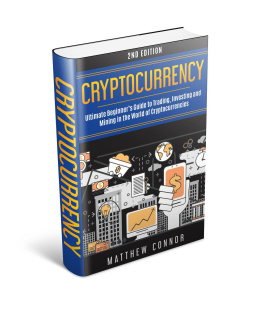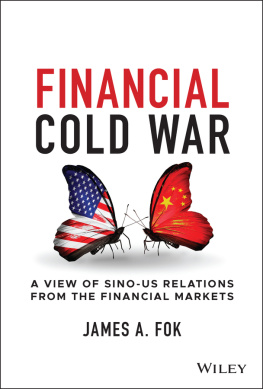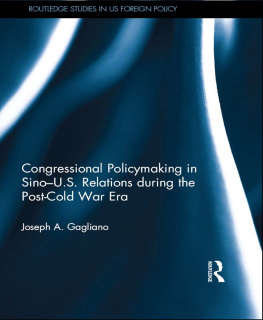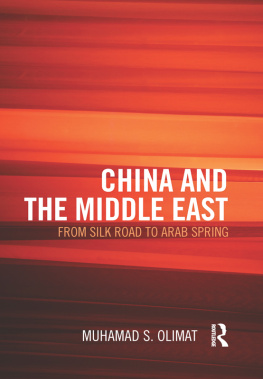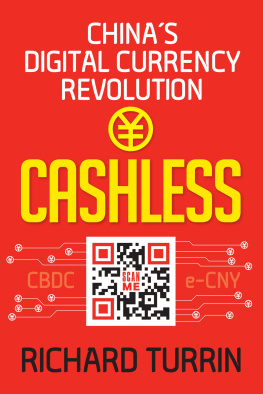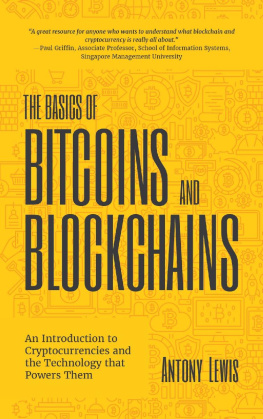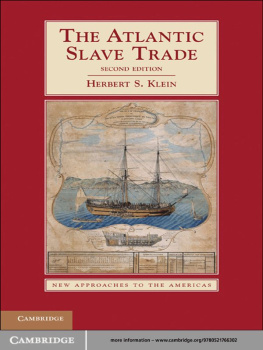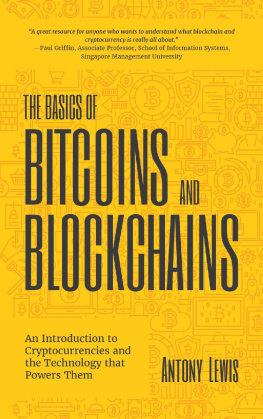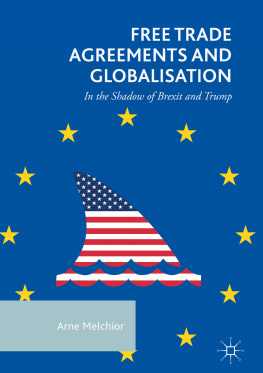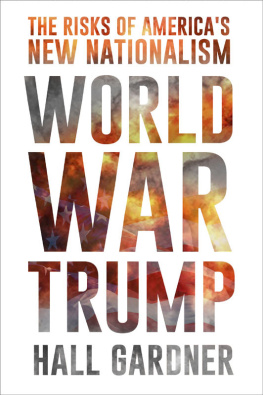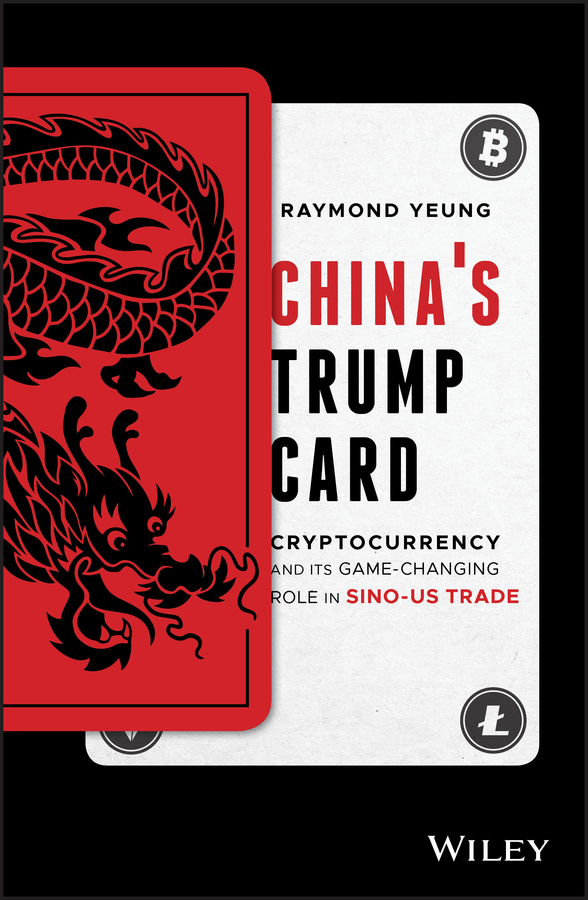
Table of Contents
List of Tables
- Chapter 1
- Chapter 2
- Chapter 3
- Chapter 4
- Chapter 5
- Chapter 6
- Chapter 7
List of Illustrations
- Chapter 1
- Chapter 2
- Chapter 3
- Chapter 4
- Chapter 5
- Chapter 6
- Chapter 7
Guide
Pages
CHINA'S TRUMP CARD
CRYPTOCURRENCY AND ITS GAME-CHANGING ROLE IN SINO-US TRADE
RAYMOND YEUNG

This edition first published 2020
2020 John Wiley & Sons, Ltd. All rights reserved.
All rights reserved. No part of this publication may be reproduced, stored in a retrieval system, or transmitted, in any form or by any means, electronic, mechanical, photocopying, recording or otherwise, except as permitted by law. Advice on how to obtain permission to reuse material from this title is available at http://www.wiley.com/go/permissions.
The right of Raymond Yeung to be identified as the author of the editorial material in this work has been asserted in accordance with law.
Registered Office(s)
John Wiley & Sons, Ltd.,
Editorial Office
111 River Street, Hoboken, NJ 07030, USA
For details of our global editorial offices, customer services, and more information about Wiley products visit us at www.wiley.com.
Wiley also publishes its books in a variety of electronic formats and by print-on-demand. Some content that appears in standard print versions of this book may not be available in other formats.
Limit of Liability/Disclaimer of Warranty
While the publisher and authors have used their best efforts in preparing this work, they make no representations or warranties with respect to the accuracy or completeness of the contents of this work and specifically disclaim all warranties, including without limitation any implied warranties of merchantability or fitness for a particular purpose. No warranty may be created or extended by sales representatives, written sales materials or promotional statements for this work. The fact that an organization, website, or product is referred to in this work as a citation and/or potential source of further information does not mean that the publisher and authors endorse the information or services the organization, website, or product may provide or recommendations it may make. This work is sold with the understanding that the publisher is not engaged in rendering professional services. The advice and strategies contained herein may not be suitable for your situation. You should consult with a specialist where appropriate. Further, readers should be aware that websites listed in this work may have changed or disappeared between when this work was written and when it is read. Neither the publisher nor authors shall be liable for any loss of profit or any other commercial damages, including but not limited to special, incidental, consequential, or other damages.
Library of Congress Cataloging-in-Publication Data
Names: Yeung, Raymond Y. T., author.
Title: Chinas Trump card : cryptocurrency and its game-changing role in Sino-US trade / Raymond Yeung.
Description: First edition. | Hoboken : Wiley, 2020. | Includes bibliographical references and index.
Identifiers: LCCN 2020025712 (print) | LCCN 2020025713 (ebook) | ISBN 9781119699125 (hardback) | ISBN 9781119699149 (adobe pdf) | ISBN 9781119699156 (epub)
Subjects: LCSH: ChinaCommerceUnited States. | United StatesCommerceChina. | TariffChina. | TariffUnited States. | ChinaForeign economic relationsUnited States. | United StatesForeign economic relationsChina. | Trump, Donald, 1946
Classification: LCC HF3838.U6 Y46 2020 (print) | LCC HF3838.U6 (ebook) | DDC 382.0951/073dc23
LC record available at https://lccn.loc.gov/2020025712
LC ebook record available at https://lccn.loc.gov/2020025713
Cover Design: Wiley
Cover Images: Dragon ly86/Getty Images,
Cryptocurrency icon Puwadol Jaturawutthichai/Shutterstock, Cardboard paper koosen/Shutterstock
To all the victims who have suffered from the deadly coronavirus. To all the medical heroes who fought selflessly in the front line.
Acknowledgments
This book could not have been completed without the help of many awesome individuals. My beloved wife Theresa read the first draft of the manuscript while serving me a bowl of noodles when I was burning the midnight oil. A special appreciation to my niece Tiffany Kwok, a smart, passionate student in political science at the University of Toronto who served as my secret reviewer and offered me helpful comments.
Thanks to everyone on the Wiley team, notably Gladys (Syd) Ganaden, Purvi Patel, and Karen Weller, who helped me so much in the publication process.
I thank my employer, Australia and New Zealand Banking Group Limited (ANZ) for approving this external engagement with Wiley. I am indebted to Richard Yetsenga, ANZ's Chief Economist, for supporting this endeavor and my personal development. Richard and many colleagues I've collaborated with closely during the past decade are an integral part of my career development.
This book covers a very complicated subject. I have benefited from many knowledgeable individuals in the business community, institutional investors, and policymakers. Many of them have significant stakes in the SinoUS economic relationship. They've offered me many different perspectives in analyzing this trillion-dollar question. I can only express my gratitude to them anonymously.
Last, but not least, without God's provision I wouldn't be able to do any of this when the world is beset by pandemic and other socio-chaotic woes.
All views expressed in this book are neither my employer's nor the aforementioned parties. All errors are solely my responsibility.
About the Author
Raymond Yeung graduated with a PhD in Economics from Queen's University in Canada and is a holder of the Financial Risk Manager (FRM) certification. He began his economist career one week prior to the Asian Financial Crisis in 1997. He is currently Chief Economist Greater China at Australia and New Zealand Banking Group Limited (ANZ), leading an award-winning team covering the region's macroeconomic and financial market research. His insights have received strong following, including institutional investors, corporate treasurers, and central banks. He speaks frequently in industry conferences and shares his views on Bloomberg, Financial Times, CNBC, Di Yi Cai Jin, and Caixin. Prior to joining ANZ, Raymond was Deputy Head of Economic Research Asia at Swiss Re. He is a Council member of China Chief Economist Forum and a columnist in the Chinese media.
Preface
When I submitted the manuscript to the Wiley team, China and the rest of the world were battling against the COVID-19 pandemic. To prevent the virus from spreading, the Chinese government imposed a lockdown policy unprecedentedly. Economic activity was weighed down acutely. Supply chains were interrupted. The global situation was also alarming as the virus cases soared in other countries, including the US. In response to the negative economic impact, the Federal Reserve reduced policy interest rate to zero and restarted quantitative easing. Other central banks also followed the Fed and eased their monetary policy.
The virus shock represented an unpredictable Black Swan event in a fashion similar to Trump's initiated trade war. When the 45th US president took over the White House in early 2017, not too many people treated his America First claim seriously. His tweets, his tariff, and his friendship with president Xi Jinping stirred up market volatility. When he started the trade war in 2018 shortly after hosting Xi in Florida, exporters were caught off guard. Many people in the financial markets regarded the trade war as the black swan of the year.
Next page

